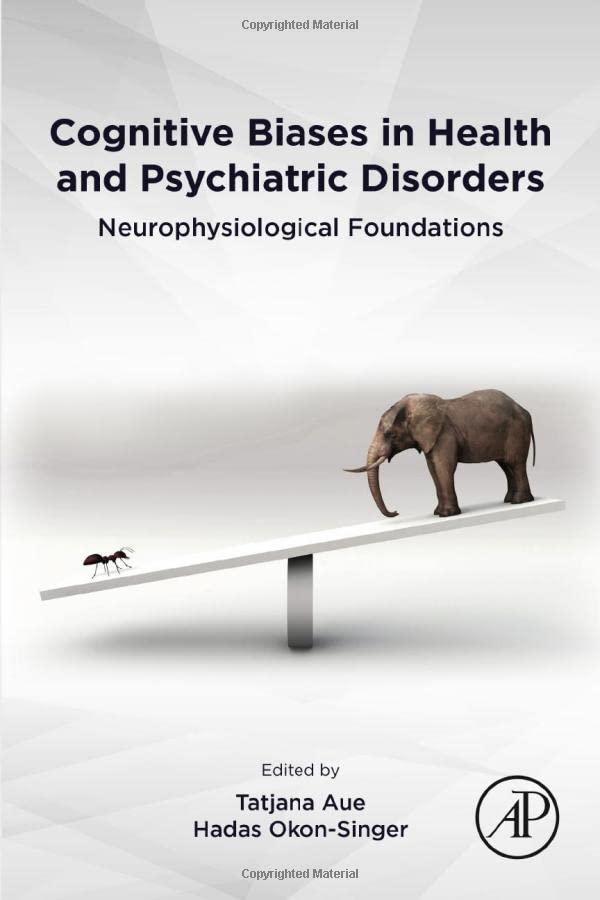-
 Thanh toán đa dạng, linh hoạtChuyển khoản ngân hàng, thanh toán tại nhà...
Thanh toán đa dạng, linh hoạtChuyển khoản ngân hàng, thanh toán tại nhà... -
 Miễn Phí vận chuyển 53 tỉnh thànhMiễn phí vận chuyển đối với đơn hàng trên 1 triệu
Miễn Phí vận chuyển 53 tỉnh thànhMiễn phí vận chuyển đối với đơn hàng trên 1 triệu -
 Yên Tâm mua sắmHoàn tiền trong vòng 7 ngày...
Yên Tâm mua sắmHoàn tiền trong vòng 7 ngày...
Cognitive Biases in Health and Psychiatric Disorders: Neurophysiological Foundations
-

- Mã sản phẩm: 0128166606
- (0 nhận xét)

- Publisher:Academic Press; 1st edition (March 10, 2020)
- Language:English
- Paperback:306 pages
- ISBN-10:0128166606
- ISBN-13:978-0128166604
- Item Weight:1.1 pounds
- Dimensions:6 x 9 inches
- Best Sellers Rank:#9,640,878 in Books (See Top 100 in Books) #2,253 in Physiology (Books) #2,285 in Neuropsychology (Books) #2,849 in Cognitive Neuroscience & Neuropsychology

Tính năng sản phẩm
• Highlight, take notes, and search in the bookMô tả sản phẩm
Product Description
Cognitive Biases in Health and Psychiatric Disorders: Neurophysiological Foundations focuses on the neurophysiological basis of biases in attention, interpretation, expectancy and memory. Each chapter includes a review of each specific bias, including both positive and negative information in both healthy individuals and psychiatric populations. This book provides readers with major theories, methods used in investigating biases, brain regions associated with the related bias, and autonomic responses to specific biases. Its end goal is to provide a comprehensive overview of the neural, autonomic and cognitive mechanisms related to processing biases.
Review
A comprehensive reference to neural, autonomic, and cognitive mechanisms related to processing biases
About the Author
Tatjana Aue is an Assistant Professor of Biological and Social Emotion Psychology at the University of Bern, Switzerland. She is an associate editor with BMC Psychiatry (Section Stress and Anxiety). Tatjana’s work addresses cognitive, social, motivational, and physiological components of emotional experiences. She is particularly interested in the neurophysiological signatures of cognitive biases in expectancies and attention and in mutual influences between these biases – both in the positive (e.g., optimism) and in the negative (e.g., fear and phobia) domains. Additional topics investigated comprise social interactions, social identification, and empathy. With her team, she combines a multitude of methods in their research, including functional magnetic resonance imaging (fMRI), electroencephalography (EEG), peripheral physiology (e.g., electrocardiography, impedance cardiography, electromyography, plethysmography), and eye tracking.
Hadas Okon-Singer is a tenured Senior Lecturer (equivalent to Assistant Professor) of Neurocognitive Emotion Psychology at the University of Haifa, Israel, and head of the Department for Cognitive Sciences. She served as associate editor in Cognition and Emotion between 2013 and 2016. Hadas’ research focuses on the cognitive mechanisms that mediate cognition-emotion interactions and the neural pathways underlying these interactions in health and disease. Together with her group, she combines behavioral assessments of reaction time and performance, autonomic measurement of heart rate and blood pressure reactions, EEG and fMRI recordings, personality questionnaires, and state-of-the-art analysis methods. Her work aims at understanding the interaction between different factors that modulate human reactions to aversive situations, focusing on attention systems and personality differences in traits, tendencies, and neural architecture. Research projects at the lab examine differences in information processing biases between anxious and depressed individuals, judgmental biases following empathy to pain, biased attention to threat cues, perception biases in social anxiety, attention biases to threat and reward cues among individuals with attention deficit hyperactivity disorder (ADHD), and blood pressure reactions to emotional cues.
- Mua astaxanthin uống có tốt không? Mua ở đâu? 29/10/2018
- Saffron (nhụy hoa nghệ tây) uống như thế nào cho hợp lý? 29/09/2018
- Saffron (nghệ tây) làm đẹp như thế nào? 28/09/2018
- Giải đáp những thắc mắc về viên uống sinh lý Fuji Sumo 14/09/2018
- Công dụng tuyệt vời từ tinh chất tỏi với sức khỏe 12/09/2018
- Mua collagen 82X chính hãng ở đâu? 26/07/2018
- NueGlow mua ở đâu giá chính hãng bao nhiêu? 04/07/2018
- Fucoidan Chính hãng Nhật Bản giá bao nhiêu? 18/05/2018
- Top 5 loại thuốc trị sẹo tốt nhất, hiệu quả với cả sẹo lâu năm 20/03/2018
- Footer chi tiết bài viết 09/03/2018
- Mã vạch không thể phân biệt hàng chính hãng hay hàng giả 10/05/2023
- Thuốc trắng da Ivory Caps chính hãng giá bao nhiêu? Mua ở đâu? 08/12/2022
- Nên thoa kem trắng da body vào lúc nào để đạt hiệu quả cao? 07/12/2022
- Tiêm trắng da toàn thân giá bao nhiêu? Có an toàn không? 06/12/2022
- Top 3 kem dưỡng trắng da được ưa chuộng nhất hiện nay 05/12/2022
- Uống vitamin C có trắng da không? Nên uống như thế nào? 03/12/2022
- [email protected]
- Hotline: 0909977247
- Hotline: 0908897041
- 8h - 17h Từ Thứ 2 - Thứ 7
Đăng ký nhận thông tin qua email để nhận được hàng triệu ưu đãi từ Muathuoctot.com
Tạp chí sức khỏe làm đẹp, Kem chống nắng nào tốt nhất hiện nay Thuoc giam can an toan hiện nay, thuoc collagen, thuoc Dong trung ha thao , thuoc giam can LIC, thuoc shark cartilage thuoc collagen youtheory dau ca omega 3 tot nhat, dong trung ha thao aloha cua my, kem tri seo hieu qua, C ollagen shiseido enriched, và collagen shiseido dạng viên , Collagen de happy ngăn chặn quá trình lão hóa, mua hang tren thuoc virility pills vp-rx tri roi loan cuong duong, vitamin e 400, dieu tri bang thuoc fucoidan, kem chống nhăn vùng mắt, dịch vụ giao hang nhanh nội thành, crest 3d white, fine pure collagen, nên mua collagen shiseido ở đâu, làm sáng mắt, dịch vụ cho thue kho lẻ tại tphcm, thực phẩm tăng cường sinh lý nam, thuoc prenatal bổ sung dinh dưỡng, kem đánh răng crest 3d white, hỗ trợ điều trị tim mạch, thuốc trắng da hiệu quả giúp phục hồi da. thuốc mọc tóc biotin























 KHUYẾN MÃI LỚN
KHUYẾN MÃI LỚN Hỗ Trợ Xương Khớp
Hỗ Trợ Xương Khớp Bổ Não & Tăng cường Trí Nhớ
Bổ Não & Tăng cường Trí Nhớ Bổ Sung Collagen & Làm Đẹp
Bổ Sung Collagen & Làm Đẹp Bổ Thận, Mát Gan & Giải Độc
Bổ Thận, Mát Gan & Giải Độc Chăm Sóc Sức khỏe Nam Giới
Chăm Sóc Sức khỏe Nam Giới Chăm Sóc Sức khỏe Nữ Giới
Chăm Sóc Sức khỏe Nữ Giới Chăm sóc Sức khỏe Trẻ Em
Chăm sóc Sức khỏe Trẻ Em Thực Phẩm Giảm Cân, Ăn Kiêng
Thực Phẩm Giảm Cân, Ăn Kiêng Bổ Sung Vitamin & Khoáng Chất
Bổ Sung Vitamin & Khoáng Chất Bổ Tim Mạch, Huyết Áp & Mỡ Máu
Bổ Tim Mạch, Huyết Áp & Mỡ Máu Bổ Mắt & Tăng cường Thị lực
Bổ Mắt & Tăng cường Thị lực Điều Trị Tai Mũi Họng
Điều Trị Tai Mũi Họng Sức Khỏe Hệ Tiêu hóa
Sức Khỏe Hệ Tiêu hóa Chăm Sóc Răng Miệng
Chăm Sóc Răng Miệng Chống Oxy Hóa & Tảo Biển.
Chống Oxy Hóa & Tảo Biển.